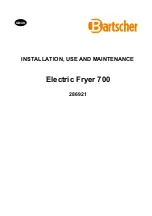
5
6
ˎ
'
ˎ
S
!
.
Ä
a
a
!
a
.
Ä
a
S
c
ʋ
ʋ
ʋ
ʋ
ʋ
ʋ
ʋ
ʋ
ʋ
ʋ
ʋ
ʋ
Care and cleaning
Dryer housing, control panel, air inlet, moisture sensors
– Wipe off with a soft, damp cloth.
– Do not use harsh cleaning agents/solvents.
– Remove detergent and cleaning agent residue immediately.
Clean the air cooler 5 or 6 times a year or
if
Vaciado de depósito/Limp.
.
/
Ä
(Container/Clean)
flashes after cleaning the fluff filter.
Air cooler
Remove the air cooler before cleaning it.
– Allow the dryer to cool.
– Residual water may leak out, so place an absorbent towel underneath
the maintenance door.
1.
Unlock the maintenance door (1).
2.
Open the maintenance door fully (2).
3.
Turn both locking levers outwards (1).
4.
Remove the front insert (2).
5.
Remove the air cooler.
Do not damage the air cooler.
When cleaning, use warm water only. Do not use hard or sharp-edged objects.
6.
Clean the air cooler completely. Let it drip completely dry.
Clean the seals.
7.
Insert the air cooler first (handle facing down), then the front insert.
8.
Turn back both locking levers.
9.
Lock the maintenance door.
Moisture sensors
The dryer is equipped with stainless steel moisture sensors. Moisture sensors measure
how damp the laundry is. A thin layer of limescale may build up on the moisture sensors
after prolonged use.
1.
Open the door.
2.
Clean the moisture sensors using a slightly damp sponge with a rough
surface.
Do not use steel wool or abrasive materials.
1
2
Information on laundry ...
Labelling of fabrics
Follow the manufacturer's care information.
(
Drying at normal temperature.
'c
Drying at a lower temperature
a
select
Delicado
(Low Heat) as well.
)c
Do not machine dry.
The safety information MUST be observed
a
page 11
!
Do not tumble-dry the following fabrics for example:
– Airtight fabrics (e.g. rubber-coated fabrics).
– Delicate materials (silk, curtains made from synthetic material)
a
they may crease.
– Laundry contaminated with oil.
Before using the dryer for the first time
– Do not put any laundry inside the dryer. Turn the programme selector to Timed
Programmes (
a
page 7
) and press
Inicio
/Stop (
Start
/Stop). At the end of the
programme, turn the programme selector to
Stop
(Off).
Drying tips
– To ensure a consistent result, sort the laundry by fabric type and drying programme.
– Always dry very small items (e.g. baby socks) together with larger items (e.g. hand towels).
– Close zips, hooks and eyelets, and button up covers. Tie cloth belts, bands, etc. together.
– Do not over-dry easy-care laundry
a
risk of creasing!
Allow laundry to finish drying in the air.
– Do not iron laundry immediately after drying, fold items up and leave for a while
a
the remaining moisture will then be distributed evenly.
– Knitted fabrics (e.g. T-shirts, jerseys) often shrink during their first drying.
a
Do not use the
Extra seco
(Very Dry) programme.
– Starched laundry is not always suitable for dryers
a
starch leaves behind a coating that
adversely affects the drying operation.
– Use the correct dosage of fabric softener as per the manufacturer's instructions when
washing the laundry to be dried.
– Use the timer programme for small loads
a
this improves the drying result.
Environmental protection/energy-saving tips
– Before drying, spin the laundry thoroughly in the washing machine
a
the higher the spin
speed, the shorter the drying time will be (consumes less energy), also spin easy-care
laundry.
– Use the maximum recommended capacity, but do not exceed it
a
Programme overview, page 7
.
– Make sure the room is well ventilated during drying.
– Clean the fluff filter after every drying operation
a
page 4.
– Do not obstruct or seal up the air inlet.
Only when switched off!
ʋ
ʋ
a
a
3


























